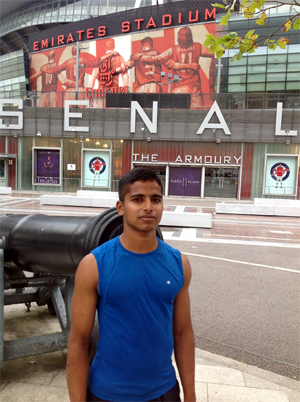Feb 05, 2026
Feb 05, 2026
 For a nation whose people love mathematical permutations it seems somewhat surprising that football is not more popular in India. Whilst cricket remains the national obsession there are nascent signs that football is beginning to attract support in areas other than West Bengal, Sikkim, Kerala and Goa.
For a nation whose people love mathematical permutations it seems somewhat surprising that football is not more popular in India. Whilst cricket remains the national obsession there are nascent signs that football is beginning to attract support in areas other than West Bengal, Sikkim, Kerala and Goa.  Diljith Rajan Punnakkal (22) embodies this hunger to succeed. A deeply thoughtful and intelligent individual, he has a keen understanding of the challenges face by those wanting to make it in football in India and beyond, as well as an appreciation of the factors that are holding back Indian football as a whole.
Diljith Rajan Punnakkal (22) embodies this hunger to succeed. A deeply thoughtful and intelligent individual, he has a keen understanding of the challenges face by those wanting to make it in football in India and beyond, as well as an appreciation of the factors that are holding back Indian football as a whole.
04-Sep-2012
More by : Mark T. Jones

|
HE IS REALLY TALENTED...HE WILL REALLY GET THE CHANCE FOR A REAL HEIGHT |

|
Gain for cricket is loss to Indian football. Indian cricketers enjoy five-star comforts. Indian footballers travel in jam-packed third-class rail boxes to tournament destinations. Cricket is oxygen to government-owned giant TV net-work called Doordarshan. 98% AIR listeners switch off their radio receivers during live criket commentary. Indian Press sinfully waste tons of newsprint on cricket. India is well set to top in population and poverty. The government is busy planning Mars mission! Indian cricketers dream to win Olympics first Gold as and when the 1¼ teams’ gimmick fantacy (a sporting game is said to be played between two equal teams ) find a place in Olympics. |

|
He seems a real talent...or else wouldn't hav been picked up by the reporter...hope he get a chance 4 trials in a good club... |

|
India need to look into sports seriously. apart from academic excellence sports must be given equal importance from the grass root ie from the school,the state as well as central govt must provide good facilities to the upcoming sportsmen to excel them in sports,,, |